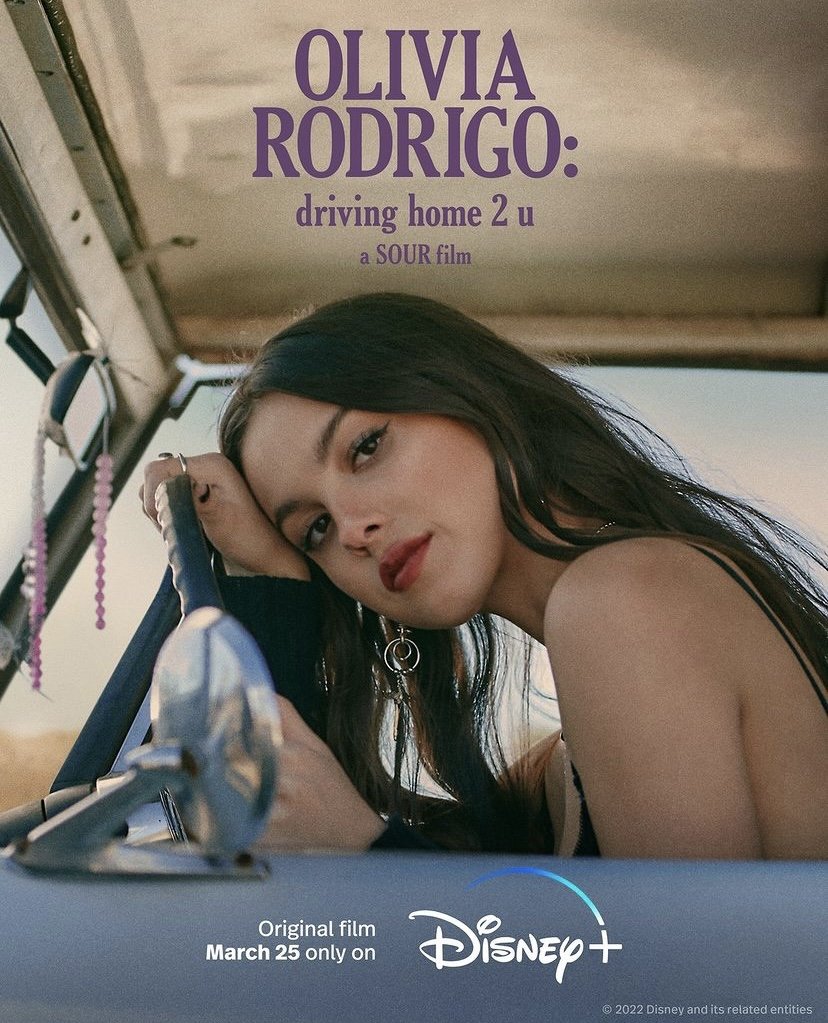Olivia Rodrigo Documentary Review & Reflection
Promotional poster for the documentary. Source: disneyplus on Instagram
Seven-time Grammy nominee, three-time Video Music Award winner, Billboard’s “Women of the Year” – all at the ripe age of 19. 2021 was the year of pop’s newest rising star: singer, songwriter and actress Olivia Rodrigo. On Friday, March 25, driving home 2 u: a SOUR film was released on Disney+. Through a reminiscent road trip from Salt Lake City to Los Angeles, the documentary includes unseen footage from the recording studio, snippets of unreleased SOUR songs and Rodrigo’s reflections on fame, friendship and heartbreak. Released only weeks before her highly anticipated tour, the artist’s intentions behind creating driving home 2 u was to provide a “concert” experience for fans who are not able to see her live on this tour. The documentary showcases unique performances, including a string orchestral production of the radio hit, “good 4 u”, and a loop pedal rendition of the heart-wrenching ballad “traitor.”
Rodrigo skyrocketed to stardom following the release of her debut single “drivers license” in January 2021. The song took over the world with its raw lyricism. However, the song’s popularity could partially be attributed to the conversations surrounding it. Within days, pop culture connoisseurs began to curate a narrative that “drivers license” told the story of a breakup between Rodrigo and one of her High School Musical: The Musical: The Series co-stars, Joshua Bassett. Bassett’s rumored relationship with triple-threat Sabrina Carpenter at the time prompted theorists to push the possibility of a love triangle. Despite this Rodrigo-Bassett relationship being entirely alleged then, the media ran with the drama surrounding “drivers license.” Rodrigo touches on this in driving home 2 u, mentioning that she was hesitant to release her follow-up single “deja vu” out of fear that she would be perpetuating this narrative which pushed a toxic “female versus female” mentality.
The release of driving home 2 u led to a brief resurfacing of the “drivers license” drama with internet users continuing to spew hateful commentary towards Bassett. Due to Rodrigo’s rapid and increasing success, nuances of the hate involuntarily endured by Carpenter and Bassett have been swept under the rug. This poses questions about systemic issues in social media surrounding empathy and respect.
An actor, singer and songwriter himself, Bassett’s life experienced an unprecedented turn in 2021. Following the release of “drivers license,” he was thrown into the love triangle narrative and was forced to watch his character be torn apart by internet users and journalists. In a December 2021 interview with GQ, Bassett opened up about the disgusting hate he received. “I would see Tik Toks with like 50 million views and 10 million likes saying, ‘If I ever see that kid on the street, I'm going to f****** kill him.’ It's hard to see that and then be…walking down the street.” In the same interview, he shared an uncomfortable experience in a New York coffee shop last summer, where the staff proceeded to play Rodrigo songs until he left. In January 2021, while the “drivers license” hate brewed, Bassett was hospitalized due to septic shock and heart failure which medical professionals believe to be correlated with stress. He was informed that he had a 30% chance of survival at a mere twenty years old. Even after opening up about this, many social media users invalidated Bassett’s near-death experience with gross commentary, specifically of homophobic nature; Bassett has recently come out as a member of the LGBTQ+ community.
During an interview on the Zach Sang Show, the artist raised an interesting point about pop culture. “I think we should really look at how much you are responsible as an artist for what conversations go on around your art,” he noted. Bassett released an EP in December 2021, “Crisis/Secret/Set Me Free” allowing him to share his truth about the past year. In a mass text message sent to fans prior to the release, he advised, “all that i ask is you treat everyone with respect and love…anyone who sends hate on my ‘behalf’ is no fan of mine.” Although Bassett has recognized that all hate cannot be stopped just at an artist’s discretion, when reflecting on 2021, he accepted that a message like his was all he could have asked for. Rodrigo has not publicly expressed distaste for the inhumane treatment directed towards Bassett in particular.
The lines between life and art can get messy, and due to Rodrigo’s lyrics being perceived as infallible, Bassett became a victim of ruthless, unwarranted hate due to a fan-curated narrative. When putting into perspective Rodrigo’s hard-earned career that driving home 2 u illustrates, it should be analyzed whether or not silence can be considered compliance. Public figures create a community for their followers where they are the primary role model. Bassett recognized this and has used the past year to become the change he wishes to see in the world, diving into a role as a mental health advocate (all of his merchandise proceeds go to charity and money earned from his song “Crisis” is being donated to mental health organizations in perpetuity). Followers emulate the behaviors of their idols, and if an environment of hatred is being nurtured without acknowledgement, outsiders are susceptible to suffering. All people, regardless of status, deserve to have their humanity respected. The veils of success blanketing many public figures today should not be excuses for disrespect, invalidation and negativity to be ignored.
